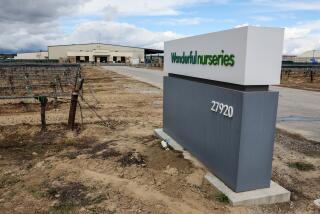Dairies in California consider incentives to move out of state
Other states have long poached California manufacturers and jobs. Now they’re coming for the cows.
Seizing on the plight of the state’s dairy industry, which is beset by high feed costs and low milk prices, nearly a dozen states are courting Golden State dairy farmers. The pitch: cheaper farm land, lower taxes, fewer environmental regulations and higher prices for their milk.
At the World Ag Expo, a behemoth trade show held in Tulare County last month, nine states had recruitment booths on the ground’s Dairy Center.
South Dakota sent its governor, Dennis Daugaard, to make a personal appeal for his state. Ag officials there estimate that a single dairy cow creates $15,000 worth of economic activity annually through feed, vet bills and the like. That translates into jobs and revenue for hard-pressed rural areas.
“We’re trying to corral some California cows,” Daugaard said recently. “We’re looking for dairymen who are looking to move out of California.”
The state’s $8-billion dairy industry leads the country in milk production. California cows produced 41.5 billion pounds of milk, or about 4.8 billion gallons, in 2011. That’s 21% of the nation’s milk supply. The next top milk-producing states, Wisconsin and Idaho, produced a combined 39.4 billion pounds of milk in 2011.
Although the migration is not yet a stampede, some California dairy farmers have left for what they see as better opportunities.
Sybrand Vander Dussen, 70, and his son, Mark, sold their 2,000-cow dairy in Corona two years ago. Mark Vander Dussen, 44, moved with his wife, Ranae, four kids and 800 Holstein heifers last year to set up shop in Greeley, Colo., where a $250-million cheese plant is under construction.
“We searched for a place that had better long-term prospects,” Mark Vander Dussen said.
His father, a partner in the venture, plans to remain in California but said he’s happy to no longer be dairy farming in the state. Sybrand Vander Dussen said when his friends heard that he was selling they said, “You’re probably the smartest dairyman in California.”
The federal government regulates milk prices in most states to prevent price volatility, but not in California, which has its own milk pricing system, established in 1935.
California dairy operators complain that the state’s system is too stingy, and they’re pushing officials to bring prices closer in line with the federal pricing system, partly to recover from tough years recently.
California farmers, for instance, endured a beat-down in 2009 when milk prices plunged from about $17 per 100 pounds to $10 per 100 pounds, driving many dairies out of business.
Then, last summer’s drought, the worst in decades, further pummeled the state’s dairy industry as it drove feed costs to record levels.
California has been steadily losing dairies in the last decade. In 2003, more than 2,100 dairies operated in California. That figure dropped to 1,563 in 2012, according to the California Department of Food and Agriculture.
Although some of the dairy loss has been the result of consolidation, the number of dairy cows in the state also has been declining, from a peak of 1.88 million in 2008 to 1.82 million in 2012.
California doesn’t track whether those businesses and bovines relocated to another state, but dairy experts say the flight of the state’s dairies has accelerated in recent years as other states have aimed to ramp up milk production to diversify their economies.
South Dakota, with about 94,000 dairy cows, wants to double that number to keep milk pumping into a $100-million cheese plant under construction.
As farmers age and their sons or daughters contemplate continuing the family business, they’re looking at moving out of state as an attractive alternative, said Michael Marsh, chief executive of Western United Dairymen, a Modesto-based trade group.
But making the move requires capital, and some dairies have already burned their equity to make it through hard times. Many dairies have simply closed or sold operations.
In recent years, an average of 100 dairies have closed annually, said Leslie Butler, an agriculture economist at UC Davis who studies the dairy industry.
“Ten years ago, California was the low-cost producer,” Butler said. With low milk prices and high feed costs, “it’s become more difficult to dairy here.”
Dairy farmers also complain that environmental standards in California are more burdensome than in other states. Those standards have been strengthened as environmentalists try to address water and air quality issues that arise from large-scale dairies, which on average have about 1,100 cows.
Navigating that red tape is one reason Mark Vander Dussen moved to Colorado.
A few weeks ago he and his father auctioned off their remaining cows in Corona. Syann Dairy, which had operated since 1969, resembled a ghost town on a recent afternoon.
The herringbone-shaped milking parlor had been stripped clean of most of its equipment. Corrals stood empty, but the smell of manure lingered heavily. The only sound was the whirring of a tractor scraping up manure onto waiting dump trucks to be hauled away.
Rafael Vasquez, 50, and a handful of workers labored diligently on the tear-down, preparing the land for the new owner, the Orange County Flood Control District, which bought the land as part of the Prado Dam expansion project.
“It’s sad it’s closing,” said Vasquez, who worked at Syann Dairy for more than 30 years.
Mark Vander Dussen, who grew up in the one-story ranch house next door, said he employed almost 40 people and extended offers to his workers to come to Greeley. So far, a couple have expressed interest.
Where the other workers will find their next jobs is still unknown. A handful of dairies are left in the area; most relocated to the Central Valley or out of state in recent years.
“This was once a thriving industry here,” Vander Dussen said, motioning toward the expanse of the Chino Basin. “There were dairies all the way to the outskirts of Ontario.”
For now, he and his dad are focusing on getting their new dairy open, possibly by the end of the year.
The two have no regrets about leaving California, where the family first started milking cows.
“The future in California is not good — not for dairies,” the elder Vander Dussen said.







